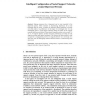Free Online Productivity Tools
i2Speak
i2Symbol
i2OCR
iTex2Img
iWeb2Print
iWeb2Shot
i2Type
iPdf2Split
iPdf2Merge
i2Bopomofo
i2Arabic
i2Style
i2Image
i2PDF
iLatex2Rtf
Sci2ools
92
Voted
AIME
2011
Springer
2011
Springer
Intelligent Configuration of Social Support Networks Around Depressed Persons
Helping someone who is depressed can be very important to the depressed person. When someone is experiencing depression, he or she frequently feels all alone. A number of supportive family members or friends can often make a big difference. In this paper we investigate how we can intelligently form a social support network, taking the needs of the support recipient and the possibilities of the potential support providers into account. To do so, we exploit dynamic models about the preferences and needs of both support providers and support recipients. The outcome of these models is used as input for a configuration process of a support network. In a case study, it is show how such an intelligently formed network results in a reduced long term stress level.
| Added | 12 Dec 2011 |
| Updated | 12 Dec 2011 |
| Type | Journal |
| Year | 2011 |
| Where | AIME |
| Authors | Azizi Ab Aziz, Michel C. A. Klein, Jan Treur |
Comments (0)

